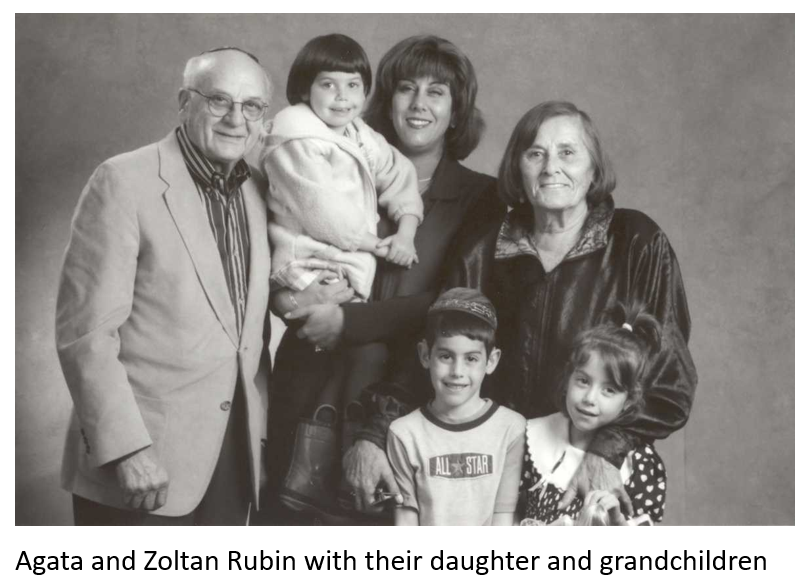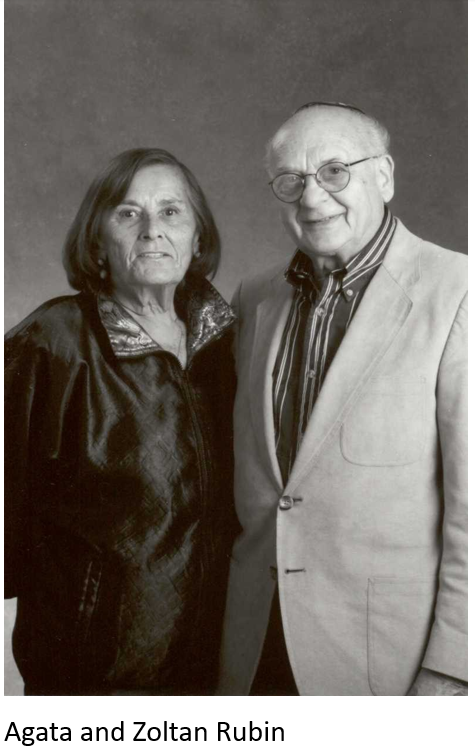Agata (Agi) Rubin
"Be informed about the world and history. Don't only look in your own backyard but next door too and have compassion for others."
Name at birth
Agata Katz
Date of birth
01/19/1930
Where were you born?
Where did you grow up?
Mukacevo, Czechoslovakia
Name of father, occupation
Abraham Katz,
Butcher
Maiden name of mother, occupation
Ilonka Katz,
Homemaker
Immediate family (names, birth order)
Parents, me and my brother Mickey who was nine years younger than me, he was 6 years old when they caught him
Who survived the Holocaust?
My father and me
My father was in a forced labor camp, he was liberated by the Russians in October 1944 in Mukacevo. He stayed in Mukacevo, waiting for the family to come home.
Only one aunt on my mother’s side survived, she was one of five siblings; she was jailed in Budapest until January 1945 for hiding a Jewish woman. Her husband and two children were later taken to Auschwitz, she felt terribly guilty that she was not there when they came for them.
I was in the Mukacevo Ghetto in 1944, one month later I was taken to Auschwitz, after Pesach (Passover) in May 1944.
I was 14 ½ years old when we arrived to Birkenau. I was the only one taken out of the lineup. They gave me the number A 6013. It’s amazing to me that my first born, Vicki, was born on June 13, or 613 similar to my number.
When I faced Mengele at the Selection, I kept running back to my mother. They threw me down three times as I tried to run to her. My poor mother saw this and motioned to me, go my child, go. That was the last time I saw my mother.
I found one of my girlfriends, her sister and her mother who survived the Selection. I formed a family with them. We slept and worked together. We cried together. We were on the death march together. We later promised each other when we would be liberated, we would go home and eat together. Unfortunately after liberation, my friend’s mother died in my arms. We three of us stay in touch with each other. January 1945, we walked in the snow on a death march. We were liberated in May 1945.
It was terrible, people weren’t people anymore. I remember at Ravensbrück, somehow there were some Russian girls with us. They would make jokes by pulling out the boards of our bunk beds making us fall. In Ravensbrück, people were dying left and right. In Malchow, we were taken by train and our train was bombed. The car next to us was hit, when they opened the doors, everyone in that car was burned.
Surviving, it just happened, you were lucky or unlucky. I felt an inner strength to overcome whatever happened to us. I had hope, I didn’t give up. We would talk about food, what was our favorite food. We talked how when we got home, my friend’s mother said I’m going to make you your favorite food. We used our imagination to help us survive.
At the end I was full of lice, it was terrible. We were actually liberated by Prisoners of War who were in the camp with us. They were good and compassionate to us; they even wanted to take us home with them. There were POW’s from France, even from Israel who had been soldiers in Crete. They couldn’t believe we spoke Hebrew. Everyone cried when they looked at us. We laughed from our Tzuris, (Yiddish for troubles). It was our way of expressing our pain. I had an inner strength not to give up. If you couldn’t work, they shot you.
On the death march, we were sleeping while we walked; two people held up the one, we slept as we walked
After liberation, in Prague, I found out that my father was alive. People were trying to find people. I went home to Budapest by train. Knocked on shoulder, it was a cousin, my emotions were so high.
I came to back to Mukacevo and found my father. It was a miracle, to have my father. I started to believe in life. My father’s sister was living in the States, she sent us papers. We arrived in the United States in 1948.
My faith in life returned. We were now living in Philadelphia.
I came to visit in Detroit where I had uncle in Detroit. I knew Zoli from before, he didn’t let me go. Zoli was living in Ontario. He kids me that he married me for my green card.
Name of Ghetto(s)
Name of Concentration / Labor Camp(s)
How is it that you came to Michigan?
By the help of a friend of my parents and a Slovak priest
When and where were you married?
1951 in Philadelphia
Spouse
Zoltan Rubin,
Salesperson for Midwest Woolen
Children
Vicky, Amy, and Randy
Grandchildren
Seven, my special bonuses
What do you think helped you to survive?
Inner strength and hope. I still maintain the same philosophy about the importance of being together as a family. I hung onto the goal that I’m going to survive. Surviving meant life.
What message would you like to leave for future generations?
Be informed about the world and history. Don't only look in your own backyard but next door too and have compassion for others.
Interviewer:
Charles Silow
Interview date:
01/01/2020
To learn more about this survivor, please visit:
The Zekelman Holocaust Center Oral History Collection
https://www.holocaustcenter.org/visit/library-archive/oral-history-department/rubin-katz-agatha/
https://www.holocaustcenter.org/visit/library-archive/oral-history-department/rubin-katz-agatha/
The Voice/Vision Holocaust Survivor Oral History Archive, University of Michigan
http://holocaust.umd.umich.edu/rubin/
http://holocaust.umd.umich.edu/rubin/
Experiences
Survivor's map


